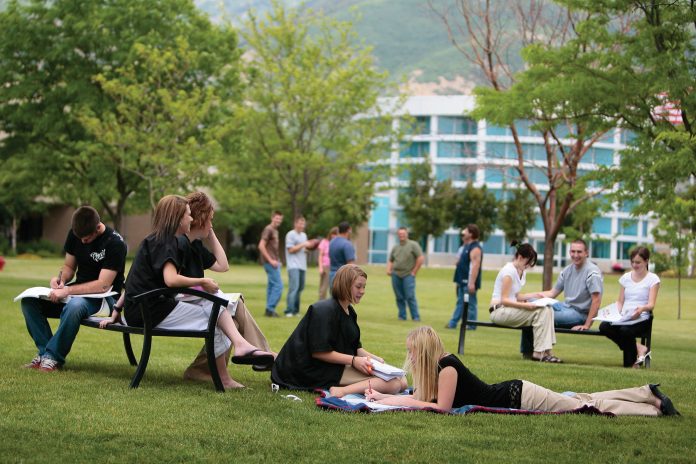With the 2017-2018 school year beginning soon, Californians need to commit to defending free speech on our college campuses.
With the 2017-2018 school year beginning soon, Californians need to commit to defending free speech on our college campuses.
“Higher education rests on the free flow of ideas,” wrote Iowa senator Chuck Grassley in an article for the Daily Signal. “Education requires that positions be held tentatively, tested by opposing arguments that are rationally considered, and evaluated. All colleges therefore must protect free speech. Public institutions must adhere to the various guarantees of the First Amendment.”
Free speech has been threatened on campuses across the nation, including several in California. While this frequently involves silencing of campus speakers, students’ rights have been threatened as well. For instance, a student at Los Angeles Pierce was reprimanded for distributing Spanish translations of the U.S. Constitution, and another at Cal Poly Pomona who was prevented from distributing pro-vegan literature outside of a limited free speech zone.
The University of California, Berkeley is the most notable example of a university where speakers have been shut down. Protests broke out last February against a scheduled speech by Milo Yiannopoulos, who was an editor for Breitbart News at the time. Approximately 150 violent protesters joined what had previously been a peaceful protest and a riot ensued, resulting in $100,000 in damage and the cancellation of Yiannopoulos’s speech. Only one person was arrested. Safety concerns later led to the cancellation of a planned speech by conservative pundit Ann Coulter.
In addition, last April, conservative author Heather Mac Donald was interrupted while lecturing at Claremont-McKenna College. Around 250 protesters blocked the entrance to the Athenaeum, where Mac Donald was scheduled to speak, and attempted to shut down her speech. Campus officials and police did not forcefully intervene or make arrests, citing safety concerns for students and others. Mac Donald was able to deliver her speech in an auditorium, but to a much smaller crowd, although a video of the speech was later posted online.
“This is not just my loss of free speech. These students are exercising brute force against their fellow students to prevent them from hearing me live,” Mac Donald later said on “Fox & Friends.”
Unfortunately, too often, college administrators sympathize with the causes of protesters– or give in to their demands to avoid criticism– and the protection of free speech suffers.
“The yawning gap between universities’ role as citadels of free inquiry and the ugly reality of campus censorship is often the fault of administrators who share the progressive belief that universities must restrict speech to protect the sensitivities of minorities and women,” Peter Berkowitz wrote in the Wall Street Journal. “Even those who aren’t ideologically committed can be wary of bad publicity. They often capitulate to the loudest and angriest demonstrators to get controversies off the front page.”
When the exchange of ideas is stifled on a college campus, everyone suffers. Students are protected from new and challenging ideas, and anyone with an unpopular opinion is encouraged to keep silent. Those who feel offended or scared by uncomfortable truths or contrary opinions learn that the proper way to respond to someone they disagree with is to shut them down, no matter the cost. Schools that do not protect the freedom of speech cannot claim to offer a quality education. Their students can easily become cowards, not scholars.
Further, when the freedom of speech is not valued, our First Amendment rights are put at risk. When college students learn that the freedom of speech is not worth protecting, or even that it is dangerous, that will affect the way they live and vote.
However, there is hope, and solutions are available. College administrators should issue a “Statement on Principles of Free Expression,” like the University of Chicago did. The statement reads:
“The University is committed to the principle that it may not restrict debate or deliberation because the ideas put forth are thought to be offensive, unwise, immoral, or wrong-headed. It is for the members of the University community to make those judgments for themselves.
As a corollary to this commitment, members of the University community must also act in conformity with this principle. Although faculty, students and staff are free to criticize, contest and condemn the views expressed on campus, they may not obstruct, disrupt, or otherwise interfere with the freedom of others to express views they reject or even loathe… As Robert M. Hutchins observed, without a vibrant commitment to free and open inquiry, a university ceases to be a university.”
In addition, Assemblywoman Melissa A. Melendez introduced the California Campus Free Speech Act last May, which would work to protect the right to the freedom of speech on all college campuses in California if it is passed.
“Liberty cannot live without the freedom to speak and nowhere is that more important than on college campuses where we educate the leaders of tomorrow,” said Melendez in a statement on her website. “The institutional silencing of individuals because of differing political ideology threatens the very foundation upon which our country was built.”
The act would nullify existing restrictive speech codes, prevent administrators from uninviting speakers, and establish a means of disciplining those who prevent others from speaking freely. It applies to public and private colleges by making some state aid to private colleges and universities dependent on compliance.
For parents and students, the best solution to ending speech suppression is to stop attending and funding colleges that do not respect the right to free speech. It is possible to make a difference. The University of Missouri is a perfect example. After many student protests, enrollment has dropped so drastically that the school has been forced to close several dormitories.
Similarly, enrollment has decreased at Evergreen State College following student protests, and the school is in danger of losing its federal funding. According to an editorial in the Seattle Times, “[Evergreen] is the only state four-year higher education institution to see enrollment drop steeply since 2011 despite wide-open admission standards. At about 4,080 students, it is about 300 students short of the Legislature’s funded enrollment target.”
If you are not happy about the extremism and the protests that engulf college campuses across the nation, stop giving them more money and helping them to limit freedom. Or, at the very least, students should be courageous in both defending their opinions and being open to hearing challenging ideas. Students should defend the rights of others to voice their opinions, even those they might find objectionable. The suppression of the freedom of speech across the country’s campuses in a big problem, and Californians need to step up and defend our rights.











